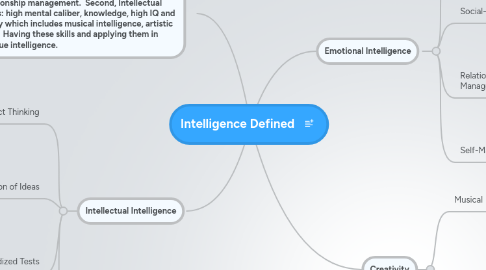
1. Intellectual Intelligence
1.1. Abstract Thinking
1.1.1. Children can acquire abstract thinking through the reading and discussion of books, being challenged by their teachers and parents to think about things on a deeper level rather than just a factual level. Abstract thinking is also something that is more naturally innate in some, than others.
1.2. Production of Ideas
1.2.1. Children can acquire this skill through their parents and teachers challenging them to produce their own ideas through dramatic play, creative activities and poetry/writing.
1.3. I.Q. - Standardized Tests
1.3.1. Children can acquire a high I.Q. through schooling and genetic aptitude. By knowing and understanding factual knowledge, having a sharp short-term memory, obtaining visual-spatial abilities, and utilizing common sense. These things can both be taught and genetically gifted.
1.4. Applied Mental Agility
1.4.1. Children can acquire applied mental agility through practicing techniques, skills and being challenged in school.
2. Intelligence is broken down into several difference facets. First, Emotional intelligence which includes self-awareness, self-management, social awareness and relationship management. Second, Intellectual intelligence which includes: high mental caliber, knowledge, high IQ and well read. Lastly, creativity which includes musical intelligence, artistic ability, and craftsmanship. Having these skills and applying them in appropriate situations is true intelligence.
3. Emotional Intelligence
3.1. Self-Awareness
3.1.1. Children Acquire Self-Awareness through both genetic gifts as well as their parents example and their own experience.
3.2. Social-Awareness
3.2.1. Children Acquire Social-Awareness through their own social experiences and observing their parents and other examples in social situations.
3.3. Relationship Management
3.3.1. Children Acquire Relationship-Management both through experience and example. This seems to be one of the aspects of emotional intelligence that seems to be innate.
3.4. Self-Management
3.4.1. Children Acquire Self-Management through experiences. They learn through social situations how to control their emotions and impulses.
4. Creativity
4.1. Musical
4.1.1. Children can acquire musical intelligence through the exposure and practice of playing a music instrument or singing. Some children will be more musically inclined than others but all people with hard work and practice can become musically intelligent.
4.2. Artistic
4.2.1. Children can acquire artistic creativity and intelligence through exposure to art, poetry, and the practice of. Some children are more naturally artistic but all children have the capacity to become artistic through experience, practice and exposure.
4.3. Craftsmanship
4.3.1. Children can acquire craftsmanship through the exposure and the practice of completing crafts and having the opportunity to use their imagination to do so.
